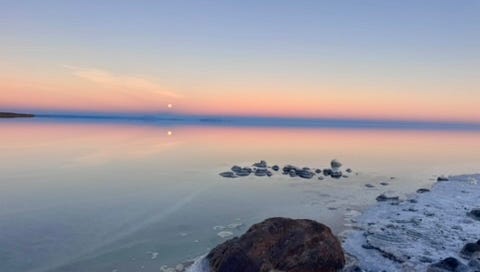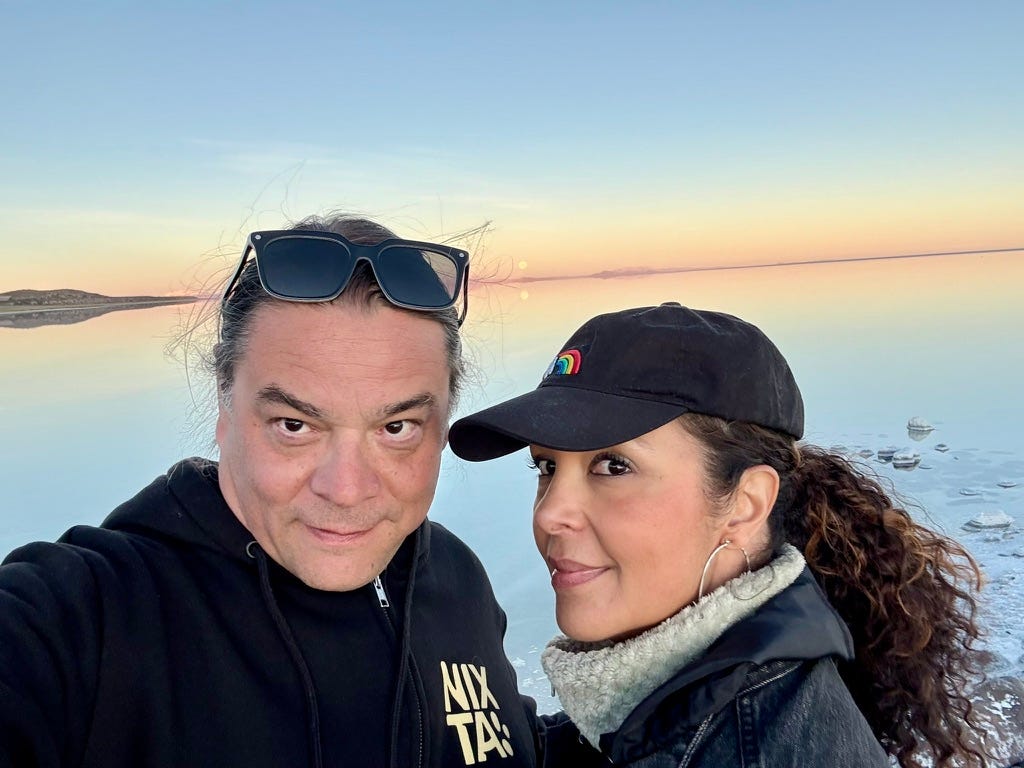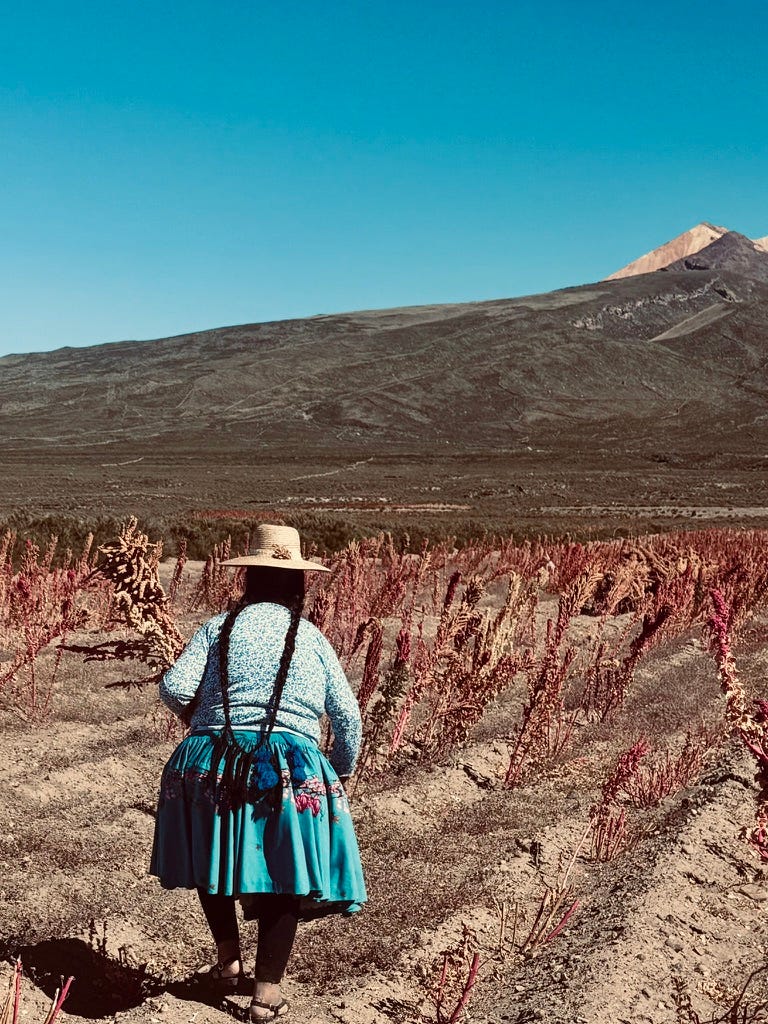Sean and I just returned from the most epic culinary tour of Bolivia, which we will write about more, both on Sean’s newsletter and probably elsewhere.
There are so many things to mention, but trying to get my makeup on in the unlikeliest of places comes to mind for me just now.
I could try to describe the otherworldly Jirira Salt Flats, the Amazonian Death Road, meeting a 17-year old farmer bringing back heirloom potato varieties, and a fourth generation Amaya quinoa farm. All once in a lifetime experiences.
But I’ve always been a bit of a glamourpuss-- my mom was one; putting on a full face of makeup each day in a lighted makeup mirror. I watched her from the time I was a baby, and it stuck. My grandmother was almost a towhead-- she thought her eyebrows and eyelashes were invisible without makeup.
So I put on makeup every day. That’s just me.
Why should you care about this? You shouldn’t. But picturing me trying to get my eyebrows on straight in a shard of mirror in the frigid bathroom of Tomarapi Ecolodge, where the llama and alpaca roam (sometimes onto our plates) at 14,000 feet above sea level is kind of funny, and a reminder to me that no matter where you go, there you are.
Experiences like these (the travel, not the eyebrows) can truly be mind-expanding, but you’re still you. The goal is to become a better version of you— but for now I’m still wrestling with my own vanity. And yet, eyebrows aside, I had a bit of an epiphany:
We stood in the tiny, woodfire-fueled kitchen of Dona Lupe, situated on her family’s fourth- generation Aymara Nation Royal Quinoa farm in Jirira, Bolivia, 319 miles south of La Paz.
Dona Lupe’s twin braids hung down her back, bound with a tullma, a traditional wool adornment. Her sun-weathered skin wore the telltale lines of her many decades (she wasn’t sure exactly how old she was, but in her 80’s for sure) and in her thick pollera, a pleated skirt that was actually forced on Indigenous women by the Spanish, she looked like a photo out of a history book. She immediately commented on Sean’s similar, singular braid, which I plait for him each morning.
“This is very typical for my tribe,” [Oglala Lakota] he told her.
Certainly, I could have been wearing Box Braids or Cornrows, one of the vestiges of West African culture that lives on in a real, daily way for African descendants in the US. But instead, my unruly, naturally curly hair was wound in a tight bun, obscured further by a ball cap.
She turned to me. “Y tu?”
I froze. I asked our guide if he could explain to her in Spanish that African peoples in North America were separated from our tribes, so I didn’t really know.
“Ella es Africana,” he told her.
“She doesn’t look like it.”
I could make this out, even with my tragic Spanish. There it was-- even in rural Bolivia, almost five thousand miles away from Minnesota-- my ethnic origin story was confusing to the casual onlooker.
“Ella es mexclada,” he explained.
And the conversation was over.
For the rest of the morning, as we ambled around Dona Lupe’s breathtaking Quinoa farm, where stalks of fiery pink and red quinoa swayed in the salt flat breeze against the backdrop of majestic Thunupa Volcano, I felt a bit foolish and apart from the rest of the group-- who were all either Indigenous or Bolivian with Indigenous roots. This is often the case when I travel with Sean, mostly in Indigenous communities in North America, and sometimes around the world.
I also noticed that I was more than a little bit angry.
Why should it have to be this way?
Why, after over four centuries of our presence in North America (and all over the world, including Bolivia) are those of us descended from enslaved Africans so removed from our tribal roots that we must stumble and stutter when asked what we are? And those of us who are mixed— more so?
Yes, the American project succeeded in a near total genocide of Native American people (When Europeans arrived in the Americas, historians estimate there were over 10 million Native Americans living there. By 1900, their estimated population was under 300,000) and yet, they are very much still here. Every Native American person I have met is aware of his or her tribal relations. Native Americans, who have many disadvantages in modern American culture have at least one distinctive advantage that I am very aware of-- still occupying their native lands, they know who they are.
I have an old friend who was born to an Oglala Lakota mother and Black father, and was raised on Pine Ridge Reservation almost exclusively with other Natives. He reports that he had no idea that he was Black until he started public elementary school off the reservation. At fifty years old, he still identifies as Oglala Lakota first.
“I feel sorry for Black people,” he once said to me, as we watched Beyonce’s Black is King, Beyonce’s musical film featuring a hodgepodge of African motifs from across the African diaspora.
“They have no idea who they are.”
Does it have to be this way? I don’t think so. With the miracle of DNA technology, I can now point to my tribe. But to get to my tribe, I will have to travel more than six thousand miles. And when I get there, what will they see? If I’m introduced to a multigenerational yam farmer, for instance, as a (sort of) Igbo, will they say, “She doesn’t look like it?”
While I do intend to take this trip sometime in the near future to find out, in the meantime, I look around to see if there are others of us who feel the way that I do. To be honest, this was not a question in my mind before meeting Sean and traveling in Indigenous circles. When I took my first DNA test, I was simply excited to see just how much Black DNA I had— much less my country, or tribe of origin.
But tribal nations mean so much. When an Indigenous person asks "what’s your tribe?” or sometimes “what’s your nation?” they are asking about your specific community, which shares a common ancestry, language, beliefs, culture, and history, signifying their people and the land they are connected to.
Like most Black people in America, I am deeply disconnected to my African ancestors, their ancestral lands, and all of the cultural signifiers connected to those lands that can help make us feel like culturally actualized humans-- connected to a community that holds certain customs and ideologies dear. In other words, the things that make us who we are. So, who am I? What is my tribe?
According to my DNA report, I’m an Igbo, and I’ll save what that means, or perhaps could mean to me for another day. But as I look around, I find that I’m in fact not alone in these questions.
“As a Black American, that feeling of not having a true place of belonging due to Anti-Blackness in America, but [also] not truly feeling connected to Africa is haunting. . . Even as I have come to accept my identity as a displaced indigenous person, sometimes the feeling of displacement weighs heavily upon me. I know I am not the only one who feels this way. Our very existence, here on American soil, is vastly different from everyone else's and while we know where we came from and where our ancestors originated from, it can sometimes feel as if we do not have a place of belonging.”
This quote is from the article “The Complex Indigenous Identity of the Black Diaspora” by Avery Oliver.
While it could be argued that African Americans are a sort of tribe unto ourselves— evolved from the mostly West African cultures that were brought here for the slave trade— I am coming to a place in my identity journey where this is not quite enough.
As Oliver puts it:
“While coming to terms with our Indigenous identities can be liberating to Black people, it does put us in an extremely difficult place when others do not see us that way. When Black people are seen as bystanders to Indigenous issues or simply branded as Indigenous allies, this complicates things as far as activism, representation and platforms to speak on. . . In some ways, this works to dehumanize us and put us and our identities in one box.”
It’s true: African American people are not Indigenous to the Americas, and diasporic Africans are not native to the lands they have been deposited on, and nor are we trying to conflate ourselves as such. But we are an Indigenous people who have been displaced.
What would this mean for our identities if we were recognized this way, and more importantly, if we were able to recognize ourselves?
This is the personal journey I am on with my book proposal Finding My Tribe (agents— I’m out here!)
Stay tuned.
Our first-ever Immigrant Kitchen event takes place next week!
If you missed out on a ticket (it sold out very quickly) keep an eye out here for our next event coming soon— we will release pre-order tickets to newsletter subscribers 24 hours before they are released to the general public.
Listen to me talking about Immigrant Kitchen on Minnesota Public Radio.







